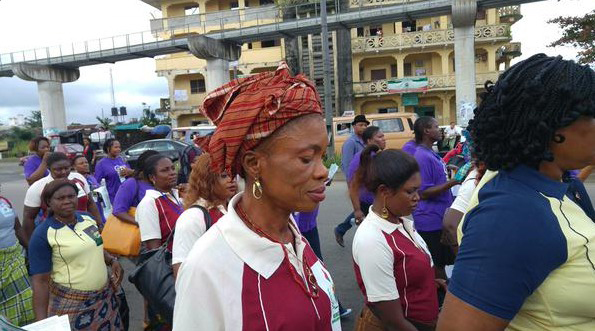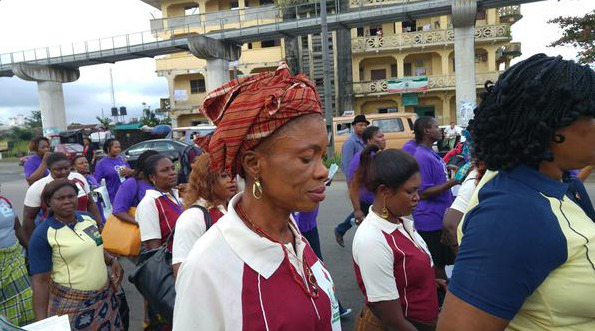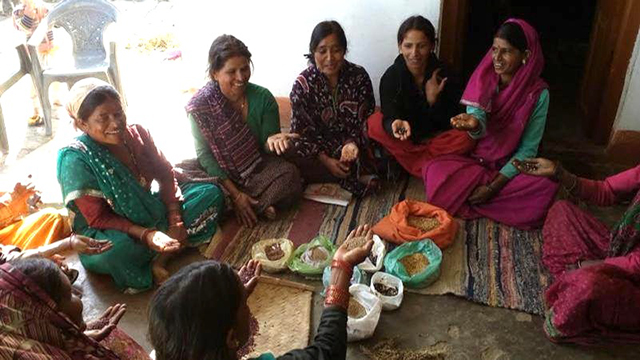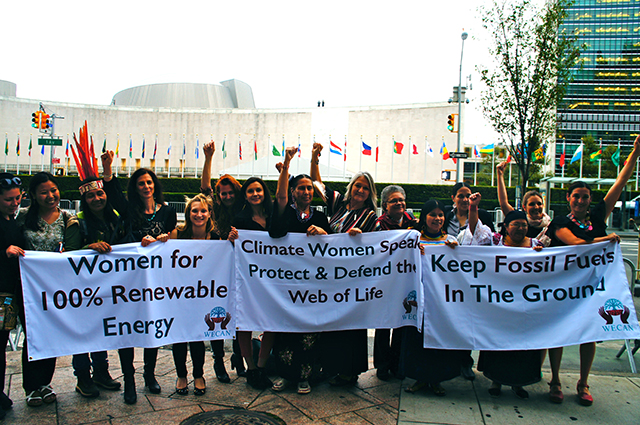
Across the world, women are on the frontlines of environmental and social degradation. Now, with ever-greater strength and resolve, they are standing up to reclaim their position at the forefront of movements to protect Mother Earth and revision and rebuild a healthy, equitable future for all.
On September 29, 2015, women from more than 50 countries joined the Global Women’s Climate Justice Day of Action, rising to make it vividly clear that women’s voices and leadership are central to just and effective action on climate change. The Day of Action was called in advance of December’s United Nation’s COP21 climate negotiations, with the expressed goal of drawing attention to both the disproportionate climate impacts that women’s face, and the vital experiences, insights, and action plans they are bringing to the table.
From the Democratic Republic of Congo to Ecuador, from the Marshall Islands to Tunisia, women shared photos, statements and event recaps highlighting the climate impacts felt in their communities, solutions they are proposing and creating, and their demands for committed action from world governments.
Collected in an online action gallery, the messages and actions shared as part of the Global Women’s Climate Justice Day of Action come together as a powerful weaving of women’s voices with a vital message: justice and healing for the Earth and justice and healing for women are inseparable.
On September 29, this message came in many forms, from women in Scotland creating art from ocean-borne trash, to vows of silence on a California university campus, to campaigns to collect signatures on the Women’s Climate Declaration, and workshops on environmental and gender justice with women and girls in Colombia.
 Women in Port Harcourt, Nigeria march in resistance to extraction in Africa. (Photo: WoMin)
Women in Port Harcourt, Nigeria march in resistance to extraction in Africa. (Photo: WoMin)
In Port Harcourt, Nigeria, the epicenter of the West African oil and gas industry, more than 120 women from Uganda, the Democratic Republic of Congo, Zimbabwe, Kenya, Malawi, Tanzania, South Africa, Ghana and Nigeria united for an exchange and March for Energy, Food and Climate Justice. Walking from the city center to the Rivers State Government House, the women presented demands for an end to government-endorsed corporate pillage of the land and communities across Africa.
As they marched, women sang songs of protest against the environmental degradation and social devastation fueled by extractive industries, and spoke out for unity and solidarity between women across the continent and the world.
“Extraction and combustion of fossil fuels has destroyed the land and livelihoods of women across the region, and its cumulative effect – climate change – will contribute to the premature death of 180 million Africans by 2100 if current trends continue,” representatives from WoMin (African Women United Against Destruction Resource Extraction) explained in a statement about the action, “This demands a rapid transition towards a model of renewable energy which is women-led, socialized, and decentralized.”
Many worldwide participants echoed this call to action with demands for their governments to keep fossil fuels in the ground and immediately finance a just transition to 100 percent renewable energy.
“We want to keep the oil in the ground and to be able to have the free right to express and associate,” explained Belen of Ecuador in her action statement about oil drilling in the Amazon basin and the ongoing persecution of land defenders and Indigenous women calling for change.
 Women farmers in Uttrakhand, India save and trade seeds on the Global Women’s Climate Justice Day of Action. (Photo: Reetu Sogani)
Women farmers in Uttrakhand, India save and trade seeds on the Global Women’s Climate Justice Day of Action. (Photo: Reetu Sogani)
In the Nainital and Almora districts of Uttrakhand, India, women gathered to save and exchange seeds on the Day of Action – drawing attention to corporate and climate threats, the vitality of local seeds in ensuring food security and sovereignty and the importance of women farmers.
“We will protect our seeds, our forests, our water, our land and we will continue to protect our rights to them,” Reetu Sogani of Chintan International Trust asserted.
Pakistani women united to discuss local climate impacts and plant fruit trees as part of a Global Women’s Climate Justice Day of Action gathering organized by Caritas Pakistan.
“Women in rural Pakistan spend most of their time in doing agricultural activities and collecting water and fuel for their families. Changing weather patterns are constantly affecting agriculture and natural resources including forest and water. As a consequence of these changes, the workload and hardship of women has increased manifold,” one of the organizers, Mansha, explained.
“Climate change is also intensifying violence against women,” she continued, “Therefore, we need to involve women from top to bottom, from policy to action, to fight against climate change and save Mother Earth from global warming.”
 WECAN and allies call for action to keep fossil fuels in the ground and defend the web of life outside of the United Nations General Assembly in New York. (Photo: Emily Arasim)
WECAN and allies call for action to keep fossil fuels in the ground and defend the web of life outside of the United Nations General Assembly in New York. (Photo: Emily Arasim)
Winona LaDuke, Founder of Honor the Earth and Mary Robinson, former President of Ireland and President of the Mary Robinson Foundation – Climate Justice also joined the Global Women’s Climate Justice Day of Action with powerful statements for justice and care for people and planet.
The Women’s Earth and Climate Action Network (WECAN International), organizers of the Global Women’s Climate Justice Day of Action, held a hub event, “Women Speak: Climate Justice on the Road to Paris and Beyond” in New York City on September 29, which ended with a direct action outside of the United Nations, with world governments gathered inside for the UN General Assembly. WECAN and allies unfurled banners calling for immediate action to keep fossil fuels in the ground and protect the web of life for all generations present and future.
Reflecting on the impetus for organizing this women’s climate justice mobilization, Women’s Earth and Climate Action Network Executive Director, Osprey Orielle Lake explained, “Women around the world are well aware that what is happening in the ‘halls of power’ is not nearly enough given the degree of climate crisis that we face and the injustices and impacts felt by women on the frontlines across the globe. This Day of Action is just a glimpse into the powerful, sustained movements that women are leading in pursuit of climate justice, gender equality and systemic change.”
Signatures collected on the Women’s Climate Declaration and actions shared as part of the Global Women’s Climate Justice Day of Action will be carried by WECAN to COP21 climate negotiations this December and beyond.
Join us in defending the truth before it’s too late
The future of independent journalism is uncertain, and the consequences of losing it are too grave to ignore. To ensure Truthout remains safe, strong, and free, we need to raise $27,000 in the next 24 hours. Every dollar raised goes directly toward the costs of producing news you can trust.
Please give what you can — because by supporting us with a tax-deductible donation, you’re not just preserving a source of news, you’re helping to safeguard what’s left of our democracy.